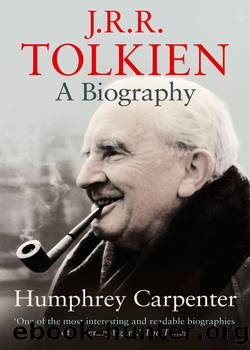J.R.R. Tolkien by Humphrey Carpenter;J.R.R. Tolkien;

Author:Humphrey Carpenter;J.R.R. Tolkien; [Carpenter, Humphrey]
Language: eng
Format: epub
Publisher: HarperCollins (Houghton Mifflin Harcourt)
Published: 1982-07-15T00:00:00+00:00
Lewis and Tolkien continued to see much of each other. Tolkien read aloud to Lewis from The Silmarillion, and Lewis urged him to press on and finish writing it. Tolkien later said of this: âThe unpayable debt that I owe to him was not âinfluenceâ as it is ordinarily understood, but sheer encouragement. He was for long my only audience. Only from him did I ever get the idea that my âstuffâ could be more than a private hobby.â
Lewisâs conversion to Christianity marked the beginning of a new stage in his friendship with Tolkien. From the early nineteen-thirties onwards the two men depended less exclusively on each otherâs company and more on that of other men. In The Four Loves Lewis states that âtwo, far from being the necessary number for Friendship, is not even the bestâ, and he suggests that each friend added to a group brings out some special characteristic in the others. Tolkien had experienced this in the T.C.B.S.; and the knot of friends which now began to come together was the ultimate expression of the T.C.B.S. principle, the âclubbableâ urge which Tolkien had felt since those adolescent days. This group was known as The Inklings.
It began to form itself at about the time (in the early nineteen-thirties) when the Coalbiters ceased to meet, having fulfilled their aim of reading all the principal Icelandic sagas and finally the Elder Edda. âThe Inklingsâ was originally the name of a literary society founded in about 1931 by a University College undergraduate named Tangye Lean. Lewis and Tolkien both attended its meetings, at which unpublished compositions were read and criticised. After Lean left Oxford the club lived on; or rather its name was transferred half jestingly to the circle of friends who gathered at regular intervals around Lewis.
The Inklings have now entered literary history, and a good deal has been written about them, much of it over-solemn. They were no more (and no less) than a number of friends, all of whom were male and Christian, and most of whom were interested in literature. Numbers of people have been stated to have been âmembersâ at this or that period, whereas in truth there was no system of membership. Some men attended more or less regularly at various periods, while others were only occasional visitors. Lewis was the invariable nucleus, without whom any gathering would have been inconceivable. A list of other names gives little idea of what the Inklings really were; but if names matter, besides Lewis and Tolkien (who was almost invariably present) among those who attended in the years before and during the war were Major Warren Lewis (C. S. Lewisâs brother, known as âWarnieâ), R. E. Havard (an Oxford doctor who attended the Lewis and Tolkien households), Lewisâs long-standing friend Owen Barfield (although, being a London solicitor, Barfield rarely came to meetings), and Hugo Dyson.
It was a thoroughly casual business. One should not imagine that the same people turned up week after week, or sent apologies if they were to be absent.
Download
This site does not store any files on its server. We only index and link to content provided by other sites. Please contact the content providers to delete copyright contents if any and email us, we'll remove relevant links or contents immediately.
| France | Germany |
| Great Britain | Greece |
| Italy | Rome |
| Russia | Spain & Portugal |
Fanny Burney by Claire Harman(26603)
Empire of the Sikhs by Patwant Singh(23086)
Out of India by Michael Foss(16853)
Leonardo da Vinci by Walter Isaacson(13337)
Small Great Things by Jodi Picoult(7146)
The Six Wives Of Henry VIII (WOMEN IN HISTORY) by Fraser Antonia(5516)
The Wind in My Hair by Masih Alinejad(5095)
A Higher Loyalty: Truth, Lies, and Leadership by James Comey(4964)
The Crown by Robert Lacey(4817)
The Lonely City by Olivia Laing(4802)
Millionaire: The Philanderer, Gambler, and Duelist Who Invented Modern Finance by Janet Gleeson(4479)
The Iron Duke by The Iron Duke(4360)
Papillon (English) by Henri Charrière(4275)
Sticky Fingers by Joe Hagan(4202)
Joan of Arc by Mary Gordon(4115)
Alive: The Story of the Andes Survivors by Piers Paul Read(4033)
Stalin by Stephen Kotkin(3969)
Aleister Crowley: The Biography by Tobias Churton(3640)
Ants Among Elephants by Sujatha Gidla(3467)
